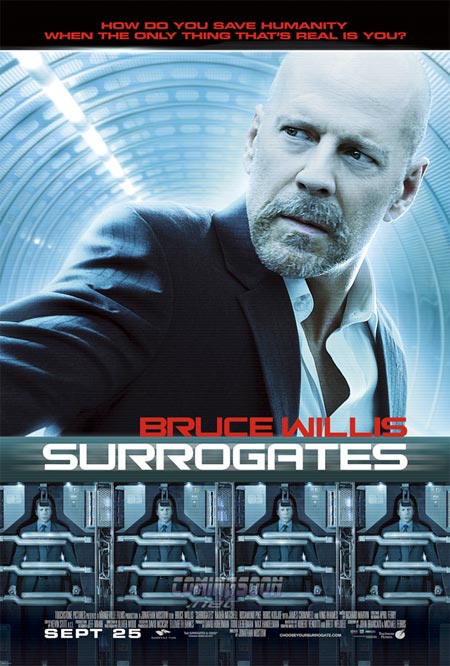Status: In theaters (opened 9/25/09)
Directed By: Jonathan Mostow
Written By: Michael Ferris & John D. Brancato
Cinematographer: Oliver Wood
Starring: Bruce Willis, Radha Mitchell, Rosamund Pike, Boris Kodjoe, Ving Rhames
Imagine the concept of Second Life taken to its logical conclusion, and you’ll be well on your way to picturing the world in which Surrogates takes place. Rather than controlling virtual avatars from their computer chairs, though, the people in this world hook into a full-body experience and control robotic facsimiles of themselves, saving themselves the trouble (and avoiding the myriad dangers) of venturing out into the real world. The opening credits sequence whisks us through the scientific and business developments that led to this point, quickly bringing us up to speed on what life in the world of Surrogates is like.
It seems all science fiction is derivative to one extent or another, combining ideas from works that have come before while introducing and exploring new ones, and Surrogates is somewhat of an extreme example of this. It’s part The Matrix, part Minority Report, part Strange Days, but it doesn’t compare terribly favorably to any of these, all of which exhibit a stronger, more focused vision than what’s on display here. That’s not to say that Surrogates is bad, necessarily, but the concepts and philosophical ideas it borrows from these previous entries in the genre are presented in more watered-down fashion. There are some interesting aspects to the philosophy of Surrogates, but none of them feel fully fleshed out. The state of the world in this movie is more used as the backdrop for a typical action-thriller, rather than as the basis for philosophical ruminations like it is in those other movies (though they each manage to include a good amount of action, too).
Where Surrogates really impresses is in its art direction and makeup design. As the world of the film is being set up, it feels like it’d be easy to become confused about when you’re watching a character in the flesh (“meatbags,” they’re called) and when you’re watching their surrogates, but this is never the case. Real people in this movie are wrinkly, scraggly, old, even kind of dirty. Their surrogates are younger, more attractive versions of themselves, with perfect skin and hair. The capabilities of the cast add significantly to this clarity, of course. This is a role that Bruce Willis handles with ease, going from the shaggy, pudgy, unkempt appearance of his character, which he plays in a manner reminiscent of his role in 12 Monkeys, to the polished look of his FBI-agent surrogate, clean-shaven, square-jawed, and sporting a well-kept toupee. His character’s wife (Rosamund Pike) exhibits similar extremes, with equally effective results.
An important aspect of any movie like this—and, indeed, a lot of the fun of getting into its story—comes from the rules at work in its world and how it brings its audience up to speed on them. Surrogates handles this well for the most part, with two annoying but significant exceptions. Its characters recite forced expository dialogue at times that feels too transparent in its aim—one FBI agent (Radha Mitchell) tells her partner, “You can’t go in there, we don’t have jurisdiction due to such-and-such a law,” for instance. A greater sin, though, is when it sets up specific rules and then breaks them; we are told throughout the first half of the film that surrogates can’t just be used by anybody, they have to be tuned to an individual operator’s neural patterns. Later in the film, though, this rule is overlooked when it suits the narrative’s purpose.
The screenplay was written by Michael Ferris and John D. Brancato, the writing team behind Terminator 3 and Terminator Salvation. Here they’ve adapted a comic series, and in having free reign to tell a self-contained story (rather than trying to fit into the canon of a previously-existing franchise), they are somewhat more successful. I really found the design of this film, along with Jonathan Mostow’s tasteful direction, to be the main draws, with the story itself taking a back seat. Its ending tries for a larger social statement than what the film feels like it’s working towards, but with surprisingly decent results. It’s another echo of Minority Report, with some Watchmen thrown in too, and while it’s not as resonant as those movies, it’s still satisfying enough in its own right.




